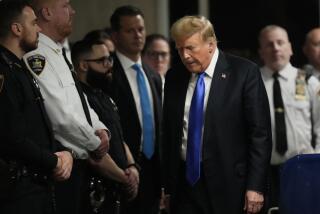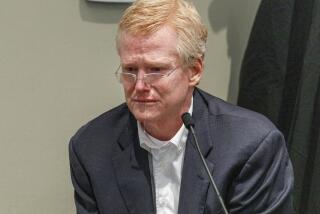Jurors Express Confidence in McVeigh Verdict
DENVER — Timothy J. McVeigh’s jurors said Saturday they needed to take only one vote to convict him and one vote to condemn him for the Oklahoma City bombing, saying the prosecution’s circumstantial case was powerful.
“Each day, progressively, he became more guilty,” said jury foreman James Osgood, among the 11 jurors who spoke with reporters one day after they sentenced McVeigh to death for the blast that killed 168 people.
“I felt confident with my decision the whole time, never had any doubt, but I needed to look him in the eye,” said John Candelaria.
The defense, on the other hand, had little evidence in the guilt phase and had little choice but to essentially admit during the penalty phase that McVeigh bombed the Alfred P. Murrah Federal Building, they said.
“What else did they have to work with?” said Tonya Stedman. “I think they did as good a job as they possibly could . . . to explain away this action. But there is no justification for that kind of action.”
Even though they sentenced him to the ultimate punishment, it was the vote finding McVeigh guilty that was the most difficult, they said.
“It took us a good hour, hour and a half for us to calm down so we could go into the courtroom,” Ruth Meier said.
Added Roger Brown: “You go into this assuming McVeigh is innocent. The most shocking blow to all of us, I know to me personally, was that, yeah, he’s guilty. And it just hit home right there.”
The penalty phase, they said, was easier.
“I can sleep at night,” Doug Carr said.
The jurors were struck by McVeigh’s lack of emotion during a trial that brought many of them to tears.
“It was hard for me to sit there and look at him,” Candelaria said.
Asked as a group what single question they would have of McVeigh, the 11 jurors answered in unison, “Why?”
“I would have liked to have heard from him. I would have liked to have known when in his life he changed,” Meier said.
“I don’t think it would have made any difference,” added Mike Leeper.
“It would have been a feel-good factor,” Stedman said. “It would have been nice to know there was some remorse on his part.”
They said they even had little concern for the holes in the prosecution’s case, including the lack of evidence that McVeigh actually built the bomb.
“The information is out there,” Brown said. “You don’t have to be a scientist to put the bomb together.”
They also didn’t worry about the possibility of unknown accomplices in the April 19, 1995, explosion, including the mysterious John Doe No. 2.
“I didn’t think that’s for us to answer,” Leeper said.
And they had no problem with the testimony by star prosecution witnesses Michael and Lori Fortier, who were heavily attacked by the defense as opportunists and liars. The Fortiers testified that McVeigh revealed his bombing plans months before the blast.
“I don’t think any of us relied totally upon it, him or his wife,” Fred Clarke said. “We used his testimony to fill in some gaps that we needed, but we corroborated most of his testimony with other pieces of evidence.”
Jurors said they were not impressed with the defense suggestion in the penalty phase that more violence could follow if McVeigh were executed.
“We were judging Tim McVeigh,” Leeper said. “We weren’t judging the future.”
They all praised the stern manner of U.S. District Judge Richard P. Matsch and his control of the courtroom. “He was the man,” Stedman said.
The jury foreman also praised prosecutors and defense attorneys for their professionalism.
“I think we can all sleep better at night, knowing the system does work,” Osgood said.
The experience, they said, left them drained. It also will never be forgotten.
“I didn’t know anyone’s last name until the day before yesterday,” Meier said. “I love all . . . of them, and we will stay an extended family forever.”
There was no explanation for why juror David Gilger was not at the news conference.
As the jurors reflected on the trial, McVeigh, 29, spent the morning with an attorney in the courthouse lockup.
“He’s doing fine,” said lawyer Randall Coyne as he left the courthouse. “It’s not Friday the 13th anymore.”
Later Saturday, McVeigh was moved to an undisclosed prison, according to TV reports.
More to Read
Sign up for Essential California
The most important California stories and recommendations in your inbox every morning.
You may occasionally receive promotional content from the Los Angeles Times.










